Variable Practice
• Enhances development of schema
- Does NOT always lead to greater performance,
- BUT to higher retention
Variable practice guidelines
– How to implement variability
-
Variations in regulatory, non-regulatory conditions
-
Depends on
closed or open skills, inter-trial
variability - Create challenges to assess progress
-
Depends on
closed or open skills, inter-trial
Variable practice guidelines
- When to implement variability
- After basic movement pattern has been learned
Contextual Interference
- Switching from one skill to another
- Changing the context in which a task is practiced from trial to trial
Contextual Interference
Blocked practice (low contextual interf.)
-
One skill or variation is practiced at a
time
- EX. 10 minutes each of passing, dribbling, shooting with no overlap
- leads to short-term performance gains
Contextual Interference
Random practice (high contextual interf.)
- Skills organized with none rehearsed twice in a row
- leads to long-term performance gains
Contextual Interference Effect
Working memory
-
stimulation houses multiple tasks
- Allows for distinctions to be formulated
Contextual Interference Effect
temporary forgetting
-
Causes temporary forgetting of task solutions between
trials
- Regeneration of task solution required
Contextual Interference Application
- Nature of task
- Task variations governed by the same
generalized
motor program - Parameter modifications elicit interference effect
- Learner characteristics: age, skill level
- Serial practice
Contextual Interference Application
• Nature of task
- Task variations governed by the same generalized motor program
- Parameter modifications elicit interference effect
Contextual Interference Application
• Learner characteristics: age, skill level
- Blocked practice => for children, novices
Contextual Interference Application
• Serial practice
- used to create moderate contextual interference
-
Combination of blocked and random practice
- Def.) a set of sequence of trials is
practiced
repeatedly (ex. repeated blocked practice)
- Def.) a set of sequence of trials is
practiced
Types of Practice
Blocked Practice
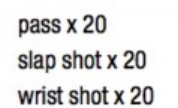
Types of Practice
Serial practice
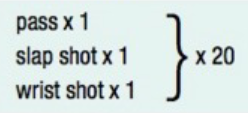
Types of Practice
Repeated-blocked practice
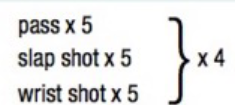
Types of Practice
Random Practice
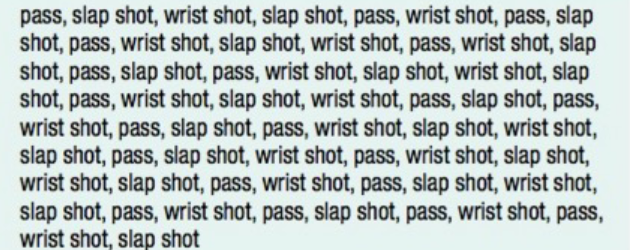
Contextual Interference Application
Challenge point framework
- Optimal amount of info must be available for learning to occur
- Info: function of skill level and task difficulty
Contextual Interference Application
Systematic increases in contextual interference facilitates learning
- Environmental difficulty increases with skill level
Contextual Interference Application
Self-regulated practice
- Learners control own practice schedule
- Increases contextual interference
Contextual Interference Implications
- Blocked practice @early stages
- Serial, repeated-blocked, random schedules
-
Don’t allow
- complete breakdown of movement pattern
-
Be aware
- of levels of motivation
Contextual Interference Implications
Serial, repeated-blocked, random schedules (combining multiple skills + skill variations)
-
Different serve locations,
- forehand/backhand practice
- Vary incline, direction, speed of movement
- Multiple objects with different sizes, textures
Practice Distribution
• Massed practice
-
Rest time between sessions < practice time
- Less rest
Practice Distribution
• Distributed practice
-
Rest time between sessions = OR > practice time
- more/equal rest with practice time
- Fosters great development of learning
Practice Distribution
• Learning advantage for...
- shorter, more frequent sessions
Practice Distribution
• Continuous skills
distributed practice
Practice Distribution
• Discrete skills
massed practice
Practice Distribution
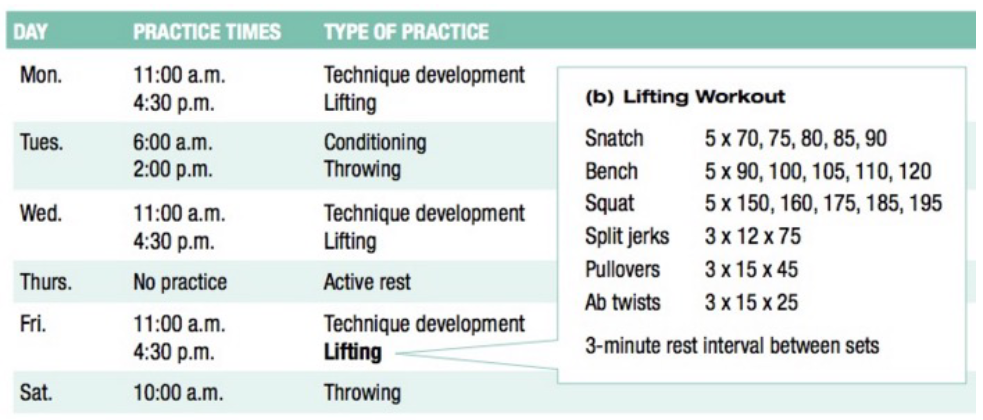
Practical Implications
Distributed practice avoids...
-
high levels of fatigue
- Fatigue introduces incorrect motor patterns, AND increases injury risk
Practical Implications
• Greater rest periods for...
- new/complex skills
- high-energy continuous tasks
Practical Implications
• Technique should be taught first when...
- learners are fresh
Practical Implications
• Massed practice good for...
-
higher skill
- leads to game like physical conditioning
Maximizing Time on Task
- Rest intervals
- Equipment substitutions
- Drill design
Maximizing Time on Task
• Rest intervals
- Fill with another activity that promotes learning, contextual interference
Maximizing Time on Task
• Equipment substitutions
- Be creative to keep everyone active
- Don’t allow substitute to change movement pattern
Maximizing Time on Task
• Drill design
- Directly target a learning goal
- Include all learners